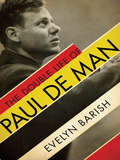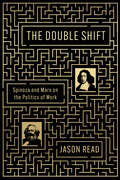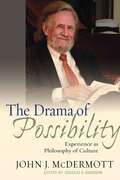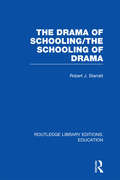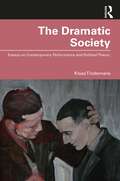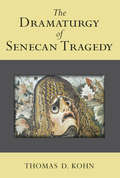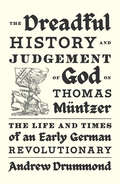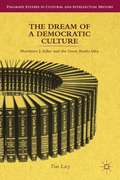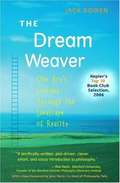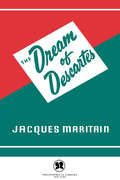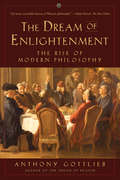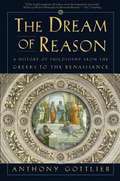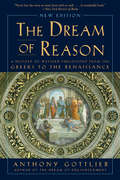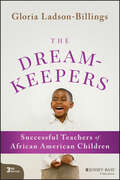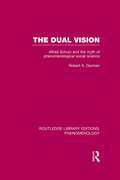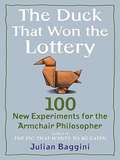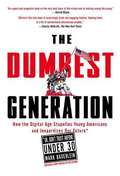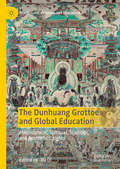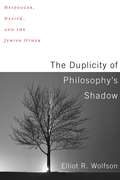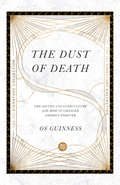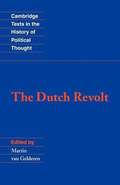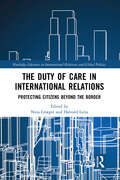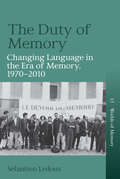- Table View
- List View
The Double Edged Helix: Social Implications of Genetics in a Diverse Society
by Adrienne Asch Jon Beckwith Peter Conrad Lisa N. Geller Joseph Alper Catherine ArdThe authors address the medical and ethical implications of the new technologies, outlining potential positive and negative effects of genetic research on minorities, people with disabilities, and those of diverse sexual orientations. Presenting a wide array of perspectives, this book emphasizes the need to ensure that research into genetics does not result in discrimination against people on the basis of their DNA.
The Double Life of Paul De Man
by Evelyn BarishA landmark biography that reveals the secret past of one of the most influential academics of the twentieth century. Over thirty years after his death in 1983, Paul de Man, a hugely charismatic intellectual who created with deconstruction an ideology so pervasive that it threatened to topple the very foundations of literature, remains a haunting and still largely unexamined figure. Deeply influential, de Man and his theory-driven philosophy were so dominant that his passing received front-page coverage, suggesting that a cult hero, if not intellectual rock star, had met an untimely end. Yet in 1988, de Man's reputation was ruined when it was discovered that he had written an anti-Semitic article and worked for a collaborating Belgium newspaper during World War II. Who was he, really, and who had he been? No one knew. Still in shock, few of his followers wanted to find out. Once an admirer, although never a theorist, the biographer Evelyn Barish began her own investigation. Relying on years of original archival work and interviews with over two hundred of de Man's circle of friends and family, most of them now dead, Barish vividly re-creates this collaborationist world of occupied Belgian and France. Born in 1919 to a rich but tragically unstable family, Paul de Man, a golden boy, was influenced by his uncle Henri de Man, a socialist turned Nazi collaborator who became the de facto Belgian prime minister. By the early 1940s, Paul, while seemingly only a reviewer for Nazi newspapers, was secretly rising in far more important jobs in Belgium's and France's collaborationist regimes. Postwar, barred from the university, de Man created a publishing house, but stole all its assets; then, facing jail, he fled to New York, abandoning his family (his opportunistic, anti-Semitic writing seemed the least of his crimes). Arriving penniless, he quickly rose again, befriending an entire generation of American writers in New York, including Dwight Macdonald, Elizabeth Hardwick, and Mary McCarthy. Barish sketches de Man's renowned careers at Bard and Yale, as well as the circumstances surrounding his loving--but bigamous--second marriage to former Bard student Patricia Kelley, who created the tranquillity he so lacked. Juxtaposing this personal story to his meteoric rise through American academia, Barish traces the origins of the philosophical deconstructionism that he later created with Jacques Derrida, showing how de Man attracted followers with his attack on the hypocrisy of society that attempts to cover up the "essential alienation" of art from "the system." While focusing on the biographical facts, this commanding and psychologically probing biography reveals as much about human behavior and the cross-currents of twentieth-century intellectual thought as it does about the man who held an entire generation in his thrall.
The Double Shift: Spinoza and Marx on the Politics of Work
by Jason Read"This book is a must read for students of contemporary capitalism."—Kathi Weeks, Duke University"Why do people fight for their exploitation as if it was liberation?" How Marx and Spinoza can explain our perverse attachment to the indignities of workIn a world of declining wages, working conditions, and instability, the response for many has been to work harder, increasing hours and finding various ways to hustle in a gig economy. What drives our attachment to work? To paraphrase a question from Spinoza, "Why do people fight for their exploitation as if it was liberation?"The Double Shift turns towards the intersection of Marx and Spinoza in order to examine the nature of our affective, ideological, and strategic attachment to work. Through an examination of contemporary capitalism and popular culture it argues that the current moment can be defined as one of "negative solidarity."The hardship and difficulty of work is seen not as the basis for alienation and calls for its transformation but rather an identification with the difficulties and hardships of work. This distortion of the work ethic leads to a celebration of capitalists as job creators and suspicion towards anyone who is not seen as a "real worker."The book is grounded in philosophy, specifically Marx and Spinoza, and is in dialogue with Plato, Smith, Hegel, and Arendt, but, at the same time, in examining contemporary ideologies and ideas about work it discusses motivational meetings at Apple Stores, the culture of Silicon Valley, and films and television from Office Space to Better Call SaulThe Double Shift argues for a transformation of our collective imagination and attachment to work.
The Drama of Possibility: Experience as Philosophy of Culture (American Philosophy)
by John J. McDermottThis book traces the trajectory of John J. McDermott’s philosophical career through a selection of his essays. Many were originally occasional pieces and address specific issues in American thought and culture. Together they constitute a mosaic of McDermott’s philosophy, showing its roots in an American conception of experience. Though he draws heavily on the thought of William James and the pragmatists, McDermott has his own unique perspective on philosophy and American life. He presents this to the reader in exquisitely crafted prose. Drawing inspiration from American history, from existentialist themes, and from personal experiences, he offers a dramatic consideration of our culture’s failures and successes. McDermott crosses disciplinary boundaries to draw on whatever works to help make sense of the issues with which he is dealing―issues rooted in medical practice, political events, pedagogical habits, and the worlds of the arts. His work thus resists simple categorization. It is precisely this that makes his vibrant prose appealing to so many both inside and outside the world of American philosophy.
The Drama of Schooling: The Schooling of Drama (Routledge Library Editions: Education)
by Robert J StarrattStarratt’s highly original book offers fresh insights into the nature of teaching, learning, schooling as a multi-cultural, social enterprise, and the importance of vision for that leadership—by using the analogy of drama. Schooling is a preparation to participate in the social drama, both as an individual and as a community. Beyond participation, schooling can enable youngsters to maintain and restore the human purposes of the social drama. This unique book accommodates present critics of schools from both the left and the right, but goes beyond them to offer a script for restoring the schools to their human and social purposes.
The Dramatic Society: Essays on Contemporary Performance and Political Theory
by Klaas TindemansAll societies are, by their very nature, dramatic. They present themselves, especially for those who want to look back in time, as a fascinating and confusing whole of theatrical events and constructions. Sometimes the theatre itself succeeds in capturing that fascination and confusion. This book describes the dramatic society in the form of case studies that link politics, history and culture. The Dramatic Society uses selected plays to examine specific moments in history. Its range of subjects are extremely diverse, including Medea as an icon of terrorism, a choreography based upon Shakespeare’s As You Like It, horror movies about the German unification, a truth commission dealing with "human zoos", and the reconstruction of Ai Weiwei’s troubles with the tax authorities. This collection of insightful essays deals with theatrical performances – including happenings, installations and movies – of the past fifty years, with every chapter attempting to link artistic events with politics and political theory, from Hannah Arendt to Slavoj Žižek. This is a revealing assessment of the ways in which drama and politics become intertwined, offering crucial insights for scholars and students of theatre studies, performance studies, contemporary politics and cultural studies.
The Dramaturgy of Senecan Tragedy
by Thomas D. KohnThe first-century Roman tragedies of Seneca, like all ancient drama, do not contain the sort of external stage directions that we are accustomed to today; nevertheless, a careful reading of the plays reveals such stage business as entrances, exits, setting, sound effects, emotions of the characters, etc. The Dramaturgy of Senecan Tragedy teases out these dramaturgical elements in Seneca's work and uses them both to aid in the interpretation of the plays and to show the playwright's artistry. Thomas D. Kohn provides a detailed overview of the corpus, laying the groundwork for appreciating Seneca's techniques in the individual dramas. Each of the chapters explores an individual tragedy in detail, discussing the dramatis personae and examining how the roles would be distributed among a limited number of actors, as well as the identity of the Chorus. The Dramaturgy of Senecan Tragedy makes a compelling argument for Seneca as an artist and a dramaturg in the true sense of the word: "a maker of drama. " Regardless of whether Seneca composed his plays for full-blown theatrical staging, a fictive theater of the mind, or something in between, Kohn demonstrates that he displays a consistency and a careful attentiveness to details of performance. While other scholars have applied this type of performance criticism to individual tragedies or scenes, this is the first comprehensive study of all the plays in twenty-five years, and the first ever to consider not just stagecraft, but also metatheatrical issues such as the significant distribution of roles among a limited number of actors, in addition to the emotional states of the characters. Scholars of classics and theater, along with those looking to stage the plays, will find much of interest in this study.
The Dreadful History and Judgement of God on Thomas Müntzer: The Life and Times of an Early German Revolutionary
by Andrew DrummondOn the 500th anniversary of the German Peasant Wars, a brilliant portrait of Thomas Munzter: radical millenarian preacher, revolutionary and iconoclast'The princes are nothing but tyrants who flay the people; they fritter away our blood and sweat on their pomp and whoring and knavery.&’ These were the words of Thomas Müntzer at the head of the massed ranks of a peasant army in the year 1525. Ranged against him were the might of the princes of the German Nation. How did Müntzer, the son of a coin maker from central Germany, rise in just a few short years to become one of the most feared revolutionaries in early modern Europe?In this brilliant work of historical excavation, Andrew Drummond charts the life and times of the man Martin Luther denounced as a &‘Ravening Wolf&’ and &‘False Prophet&’. Drummond shows us Müntzer as a human being. Far from the bloodthirsty devil of legend, he was a man of considerable learning and principle, deeply sympathetic to the misery of the peasantry and the poor. In his short life – he was beheaded at thirty-five – Müntzer promised to fundamentally upend German society.Seeking to save Müntzer from the condescension of history, Drummond guides us through the religious and political disputes of the Reformation, placing his life and thought in the context of those turbulent years. The result is a portrait of an often contradictory but always radical figure, one who continues to inspire movements of the poor across the globe.
The Dream Of A Democratic Culture
by Tim LacyThis book presents a moderately revisionist history of the great books idea anchored in the following movements and struggles: fighting anti-intellectualism, advocating for the liberal arts, distributing cultural capital, and promoting a public philosophy, anchored in mid-century liberalism, that fostered a shared civic culture.
The Dream Weaver: One Boy's Journey through the Landscape of Reality
by Jack Bowen"How sure can you be that you're not dreaming right now?" "Up until now, completely sure," I responded. "Dreams aren't really anything like reality. Dreams are, well, they're more dreamy. You can just tell. Things happen in dreams that don't happen in reality. Usually, anyway. " The hero of The Dream Weaver, young Ian Pinkle, encounters a world full of the unknown. With the help of a mentor and a friend or two, he sheds light on some of life's most difficult questions: How do we determine morality? What is the meaning of life? Does God exist? How can we determine Truth? Fairness? What are the mind and soul like? Ian--in his playful, curious manner--addresses these questions in a way that lets readers develop their own answers, and in doing so, he guides the readers through a history of philosophical thought in a clever, conversational and even adventurous style. This allows readers to think for themselves, ask questions themselves--and to be philosophers themselves. Alongside Ian's story are annotations that connect Ian's dilemmas and insights to some of the most renowned thinkers throughout history. Whether Ian is creating universes to explore the apparent paradoxical issues of evil, or playfully addressing (and solving!) the chicken-or-the-egg question, he will provide all readers with both "a ha!" moments and moments that challenge their most firmly rooted foundations. And all the while, there's a nice little surprise waiting at the end.
The Dream of Descartes
by Jacques MaritainThe Dream of Descartes by Francois Mauriac contains articles appearing in 1920 and 1922, a lecture, and other essays. This book was written to determine the value and significance of the Cartesian Reform with regard to metaphysical and theological wisdom. Descartes was also known for his work in producing the Cartesian Theory of Fallacies. This can be most easily explored using the statement: This statement is a lie. While it is most commonly referred to as a paradox, the Cartesian Theory of Fallacies states that at any given time a statement can be both true and false simultaneously because of its contradictory nature. The statement is true in its fallacy. Thus, Descartes developed the Cartesian Theory of Fallacies, which greatly influenced the thinking of the time. Many would-be philosophers were trying to develop inexplicable statements of seeming fact, however, this laid rumors of such a proposition impossible. Many philosophers believe that when Descartes formulated his Theory of Fallacies, he intended to be lying, which in and of itself embodies the theory. Titles in this book are The Deposition of Wisdom, The Cartesian Proofs of God, and The Cartesian Heritage. Mauriac, Franois 1885-1970, French writer. Mauriac achieved success in 1922 and 1923 with Le Baiser au lpreux and Genitrix (tr. of both in The Family, 1930). Generally set in or near his native Bordeaux, his novels are imbued with his profound, though nonconformist, Roman Catholicism. His characters exist in a tortured universe; nature is evil and man eternally prone to sin. His major novels are The Desert of Love (1925, tr. 1929), Thrse (1927, tr. 1928), and Vipers' Tangle (1932, tr. 1933). Other works include The Frontenacs (1933, tr. 1961) and Woman of the Pharisees (1941, tr. 1946); a life of Racine (1928) and of Jesus (1936, tr. 1937); and plays, notably Asmode (1938, tr. 1939). Also a distinguished essayist, Mauriac became a columnist for Figaro after World War II. Collections of his articles and essays include Journal, 1932-39 (1947, partial tr. Second Thoughts, 1961), Proust's Way (1949, tr. 1950), and Cain, Where Is Your Brother? (tr. 1962). Mauriac received the 1952 Nobel Prize in Literature.
The Dream of Enlightenment: The Rise of Modern Philosophy
by Anthony GottliebThe author of the classic The Dream of Reason vividly explains the rise of modern thought. Western philosophy is now two and a half millennia old, but much of it came in just two staccato bursts, each lasting only about 150 years. In his landmark survey of Western philosophy from the Greeks to the Renaissance, The Dream of Reason, Anthony Gottlieb documented the first burst, which came in the Athens of Socrates, Plato, and Aristotle. Now, in his sequel, The Dream of Enlightenment, Gottlieb expertly navigates a second great explosion of thought, taking us to northern Europe in the wake of its wars of religion and the rise of Galilean science. In a relatively short period--from the early 1640s to the eve of the French Revolution--Descartes, Hobbes, Spinoza, Locke, Leibniz, and Hume all made their mark. The Dream of Enlightenment tells their story and that of the birth of modern philosophy. As Gottlieb explains, all these men were amateurs: none had much to do with any university. They tried to fathom the implications of the new science and of religious upheaval, which led them to question traditional teachings and attitudes. What does the advance of science entail for our understanding of ourselves and for our ideas of God? How should a government deal with religious diversity--and what, actually, is government for? Such questions remain our questions, which is why Descartes, Hobbes, and the others are still pondered today. Yet it is because we still want to hear them that we can easily get these philosophers wrong. It is tempting to think they speak our language and live in our world; but to understand them properly, we must step back into their shoes. Gottlieb puts readers in the minds of these frequently misinterpreted figures, elucidating the history of their times and the development of scientific ideas while engagingly explaining their arguments and assessing their legacy in lively prose. With chapters focusing on Descartes, Hobbes, Spinoza, Locke, Pierre Bayle, Leibniz, Hume, Rousseau, and Voltaire--and many walk-on parts--The Dream of Enlightenment creates a sweeping account of what the Enlightenment amounted to, and why we are still in its debt.
The Dream of Reason: A History of Philosophy from the Greeks to the Renaissance
by Anthony Gottlieb"His book...supplant[s] all others, even the immensely successful History of Western Philosophy by Bertrand Russell."--A. C. Grayling Already a classic in its first year of publication, this landmark study of Western thought takes a fresh look at the writings of the great thinkers of classic philosophy and questions many pieces of conventional wisdom. The book invites comparison with Bertrand Russell's monumental History of Western Philosophy, "but Gottlieb's book is less idiosyncratic and based on more recent scholarship" (Colin McGinn, Los Angeles Times). A New York Times Notable Book, a Los Angeles Times Best Book, and a Times Literary Supplement Best Book of 2001.
The Dream of Reason: A History of Western Philosophy from the Greeks to the Renaissance
by Anthony Gottlieb"His book...supplant[s] all others, even the immensely successful History of Western Philosophy by Bertrand Russell."--A. C. Grayling Already a classic, this landmark study of early Western thought now appears in a new edition with expanded coverage of the Middle Ages. This landmark study of Western thought takes a fresh look at the writings of the great thinkers of classic philosophy and questions many pieces of conventional wisdom. The book invites comparison with Bertrand Russell's monumental History of Western Philosophy, "but Gottlieb's book is less idiosyncratic and based on more recent scholarship" (Colin McGinn, Los Angeles Times). A New York Times Notable Book, a Los Angeles Times Best Book, and a Times Literary Supplement Best Book of 2001.
The Dreamkeepers: Successful Teachers of African American Children
by Gloria Ladson-BillingsDiscover how to give African American children the education they deserve with this updated new resource In the newly revised Third Edition of The Dreamkeepers: Successful Teachers of African American Children, distinguished professor Dr. Gloria Ladson-Billings delivers an encouraging exploration of the future of education for African American students. She describes eight exemplary teachers, all of whom differ in their personal style and methods, who share an approach to teaching that affirms and strengthens cultural identity. In this mixture of scholarship and storytelling, you’ll learn how to create intellectually rigorous and culturally relevant classrooms that have the power to improve the lives of all children. This important book teaches: What successful teachers do, don’t do, and what we can learn from them Why it’s so important for teachers to work with the unique strengths each student brings to the classroom How to improve educational outcomes for African American children across the country Perfect for teachers, parents, school leaders, and administrators, The Dreamkeepers will also earn a place in the libraries of school boards, professors of education, urban sociologists, and casual readers with an interest in issues of race and education.
The Dual Vision: Alfred Schutz and the Myth of Phenomenological Social Science (Routledge Library Editions: Phenomenology)
by Robert GormanThis study, originally published in 1977, focuses on a critical examination of the life-work of Alfred Schutz, the most important and influential ‘father’ of several recent schools of empirical social research. The author shows why Shutz and his followers fail in their attempts to ‘humanize’ empirical social science. The problems they encounter, he argues, are due to their attempt to achieve a methodological synthesis of self-determining subjectivity and empirical criteria of validation, based on Schutz’s heuristic adoption of relevant ideas from Weber and Husserl. This is, in effect, an artificial union of subjectivity and objectivity – their ‘dual vision’ – that satisfies neither phenomenological nor naturalist perspectives. Dr Gorman suggests that the radical implications of phenomenology must lead to a consistent, socially-conscious method of inquiry, and, in a final chapter, he re-defines the methodological implications of phenomenology with the aid of existential and Marxist categories.
The Duck That Won the Lottery
by Julian BagginiFrom the author of the "hugely entertaining"(Publishers Weekly) The Pig That Wants to Be Eaten, lessons in debunking the faulty arguments we hear every day This latest book from the pop philosophy author of The Pig That Wants to Be Eaten tackles an endlessly fascinating area of popular debate-the faulty argument. Julian Baggini provides a rapid-fire selection of short, stimulating, and entertaining quotes from a wide range of famous people in politics, the media, and entertainment, including Donald Rumsfeld, Emma Thompson, Tony Blair, Bill Clinton, and Chris Martin. Each entry takes as its starting point an example of highly questionable-though oddly persuasive-reasoning from a broad variety of subjects. As Baggini teases out the logic in the illogical, armchair philosophers and aficionados of the absurd will find themselves nodding their heads as they laugh out loud. The Duck That Won the Lottery is perfect fodder for any cocktail party and pure pleasure for anyone who loves a good brain twister. .
The Dumbest Generation
by Mark BauerleinThis shocking, surprisingly entertaining romp into the intellectual nether regions of today's underthirty set reveals the disturbing and, ultimately, incontrovertible truth: cyberculture is turning us into a society of know-nothings. .
The Dumbest Generation
by Mark BauerleinThis shocking, surprisingly entertaining romp into the intellectual nether regions of today's underthirty set reveals the disturbing and, ultimately, incontrovertible truth: cyberculture is turning us into a society of know-nothings. The Dumbest Generation is a dire report on the intellectual life of young adults and a timely warning of its impact on American democracy and culture. For decades, concern has been brewing about the dumbed-down popular culture available to young people and the impact it has on their futures. But at the dawn of the digital age, many thought they saw an answer: the internet, email, blogs, and interactive and hyper-realistic video games promised to yield a generation of sharper, more aware, and intellectually sophisticated children. The terms "information superhighway" and "knowledge economy" entered the lexicon, and we assumed that teens would use their knowledge and understanding of technology to set themselves apart as the vanguards of this new digital era. That was the promise. But the enlightenment didn't happen. The technology that was supposed to make young adults more aware, diversify their tastes, and improve their verbal skills has had the opposite effect. According to recent reports from the National Endowment for the Arts, most young people in the United States do not read literature, visit museums, or vote. They cannot explain basic scientific methods, recount basic American history, name their local political representatives, or locate Iraq or Israel on a map. The Dumbest Generation: How the Digital Age Stupefies Young Americans and Jeopardizes Our Future is a startling examination of the intellectual life of young adults and a timely warning of its impact on American culture and democracy. Over the last few decades, how we view adolescence itself has changed, growing from a pitstop on the road to adulthood to its own space in society, wholly separate from adult life. This change in adolescent culture has gone hand in hand with an insidious infantilization of our culture at large; as adolescents continue to disengage from the adult world, they have built their own, acquiring more spending money, steering classrooms and culture towards their own needs and interests, and now using the technology once promoted as the greatest hope for their futures to indulge in diversions, from MySpace to multiplayer video games, 24/7. Can a nation continue to enjoy political and economic predominance if its citizens refuse to grow up? Drawing upon exhaustive research, personal anecdotes, and historical and social analysis, The Dumbest Generation presents a portrait of the young American mind at this critical juncture, and lays out a compelling vision of how we might address its deficiencies. The Dumbest Generation pulls no punches as it reveals the true cost of the digital age--and our last chance to fix it.
The Dunhuang Grottoes and Global Education: Philosophical, Spiritual, Scientific, and Aesthetic Insights (Spirituality, Religion, and Education)
by Xu DiThis book analyzes the murals and texts of the Dunhuang Grottoes, one of the most famous sites of cultural heritage on the Silk Road in Northwest China, from an educational perspective. The Dunhuang Grottoes are well-known in the world for their stunning beauty and magnificence, but the teaching of Dunhuang advocates a philosophical perspective that cosmos, nature, and humanity are an interconnected whole, and that all elements function interactively according to universal and relational principles of continuity, cause-and-effect, spiritual connection, and enlightenment. Xu Di and volume contributors highlight the moral education and ethics found throughout the Dunhuang with numerous stories of the personal journeys and growth of the Buddha and bodhisattvas, discussing and analyzing these teachings, and their possible implications for modern education systems throughout China and the world today.
The Duplicity of Philosophy's Shadow: Heidegger, Nazism, and the Jewish Other
by Elliot R. WolfsonMartin Heidegger (1889–1976) is considered one of the most influential philosophers of the twentieth century in spite of his well-known transgressions—his complicity with National Socialism and his inability to show remorse or compassion for its victims. In The Duplicity of Philosophy’s Shadow, Elliot R. Wolfson intervenes in a debate that has seen much attention in scholarly and popular media from a unique perspective, as a scholar of Jewish mysticism and philosophy who has been profoundly influenced by Heidegger’s work.Wolfson sets out to probe Heidegger’s writings to expose what remains unthought. In spite of Heidegger’s explicit anti-Semitic statements, Wolfson reveals some crucial aspects of his thinking—including criticism of the biological racism and militant apocalypticism of Nazism—that betray an affinity with dimensions of Jewish thought: the triangulation of the concepts of homeland, language, and peoplehood; Jewish messianism and the notion of historical time as the return of the same that is always different; inclusion, exclusion, and the status of the other; the problem of evil in kabbalistic symbolism. Using Heidegger’s own methods, Wolfson reflects on the inextricable link of truth and untruth and investigates the matter of silence and the limits of speech. He challenges the tendency to bifurcate the relationship of the political and the philosophical in Heidegger’s thought, but parts company with those who write off Heidegger as a Nazi ideologue. Ultimately, The Duplicity of Philosophy’s Shadow argues, the greatness and relevance of Heidegger’s work is that he presents us with the opportunity to think the unthinkable as part of our communal destiny as historical beings.
The Dust of Death: The Sixties Counterculture and How It Changed America Forever (The IVP Signature Collection)
by Os GuinnessIn 1968, at the climax of the sixties, Os Guinness visited the United States for the first time. There he was struck by an impression he'd already felt in England and elsewhere: beneath all the idealism and struggle for freedom was a growing disillusionment and loss of meaning. "Underneath the efforts of a generation," he wrote, "lay dust." Even more troubling, Christians seemed uninformed about the cultural shifts and ill-equipped to respond. Guinness took on these concerns by writing his first book, The Dust of Death. In this milestone work, leading social critic Guinness provides a wide-ranging, farsighted analysis of one of the most pivotal decades in Western history, the 1960s. He examines the twentieth-century developments of secular humanism, the technological society, and the alternatives offered by the counterculture, including radical politics, Eastern religions, and psychedelic drugs. As all of these options have increasingly failed to deliver on their promises, Guinness argues, Westerners desperately need another alternative—a Third Way. This way "holds the promise of realism without despair, involvement without frustration, hope without romanticism." It offers a stronger humanism, one with a solid basis for its ideals, combining truth and beauty. And this Third Way can be found only in the rediscovery and revival of the historic Christian faith. First published in 1973, The Dust of Death is now back in print as part of the IVP Signature Collection, featuring a new design and new preface by the author. This classic will help readers of every generation better understand the cultural trajectory that continues to shape us and how Christians can still offer a better way.
The Dutch Revolt
by Martin Van GelderenThis is a major new English-language edition of five central texts in the history of the political thought of the Dutch Revolt. Published between 1570-1590 these texts exemplify the development of the political ideas that motivated and legitimated resistance to Philip II. The introduction locates these ideas in their political and intellectual context and argues that they were inspired by the indigenous legacy of Dutch constitutionalism and civic consciousness.
The Duty of Care in International Relations: Protecting Citizens Beyond the Border (Routledge Advances in International Relations and Global Politics)
by Nina Graeger Halvard LeiraThis book offers a first overarching look at the relationship between states and their citizens abroad, approached through the concept 'Duty of Care'. How can society best be protected, when increasing numbers of citizens are found outside the borders of the state? What are the limits to care – in theory as well as in practical policy? With over 1.2 billion tourists crossing borders every day and more than 230 million expatriates, questions over the sort of duty states have for citizens abroad are politically pressing. Contributors explore both theoretical topics and empirical case studies, examining issues such as as how to care for citizens who become embroiled in political or humanitarian crises while travelling, and exploring what rights and duties states should acknowledge toward nationals who have opted to take up arms for terrorist organizations. This work will be of great interest to scholars in a wide range of academic fields including international relations, international security, peacebuilding, ethics and migration.
The Duty of Memory: Changing Language in the Era of Memory, 1970 – 2010 (Worlds of Memory)
by Sébastien LedouxWithin France, the expression “duty of memory” (le devoir de mémoire)speaks to a complex and ever-evolving relationship with the past. Emerging in the 1970s, this term raised questions about memorialization which dominated public debates in the 1990s, highlighting France’s entanglements with colonialism and the Holocaust. Drawing on a variety of interviews, archival sources, and data surveys, author Sébastien Ledoux spotlights how the trajectory of this term offers a lens for understanding contemporary societies’ relationship with the past on a global scale.

